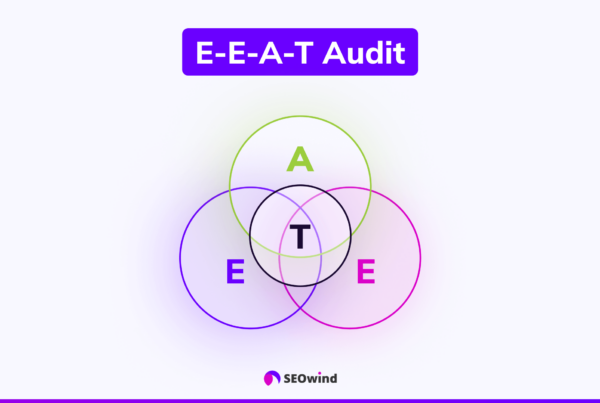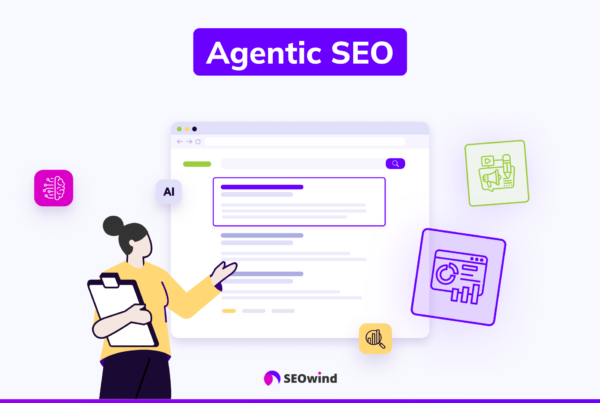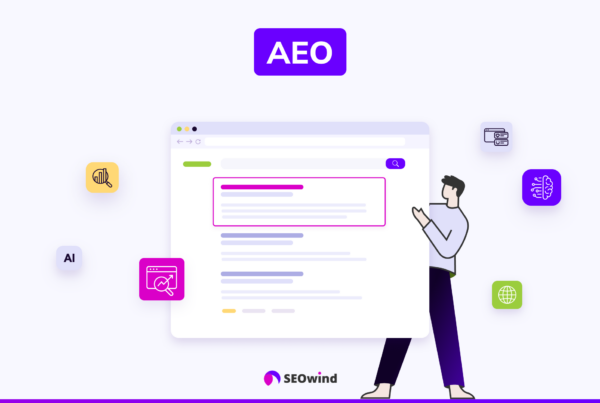In an era in which AI is increasingly integral to our daily lives, it’s unsurprising that AI has also made significant inroads into content creation. However, this has left many digital marketers and content creators asking whether AI content ranks in Google. With businesses leveraging AI to streamline operations and enhance productivity, understanding how Google treats AI-generated material is crucial for optimizing your digital strategy.
Understanding Google’s Perspective on AI-Generated Content
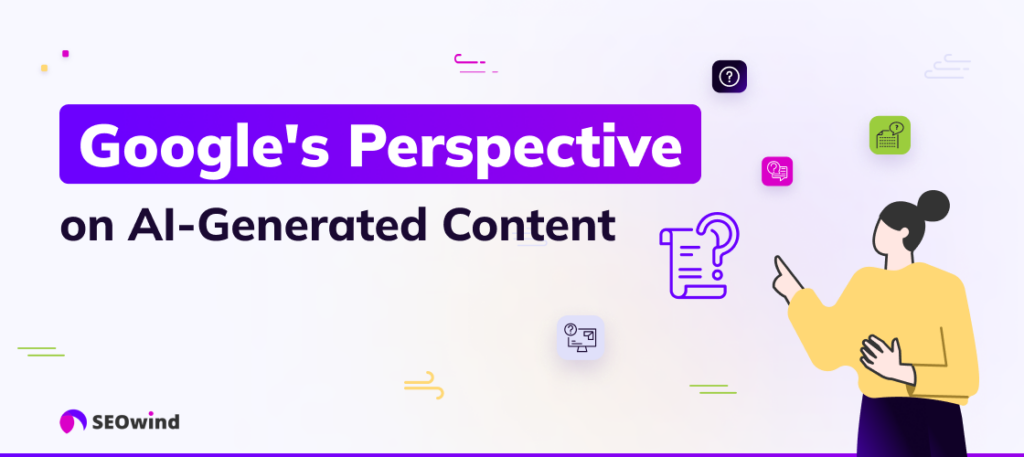
Google has always been a front-runner in embracing innovative technologies. But it maintains a complex relationship with AI-generated content. The search engine focuses on the value delivered to its users, scrutinizing how closely web content aligns with user intent. This scrutiny extends to AI-created material.
Criteria for Rewarding High-Quality, Automated Content
Let’s try to understand what Google considers high-quality automated content. Here are a few criteria that can help clarify this:
- Relevancy: The content must match the user’s search intent.
- Originality: Published material should provide unique insights rather than merely echoing existing information.
- Comprehensiveness: The text needs to cover topics extensively and from multiple angles.
- Engagement: Users’ interactions with the content, which might include sharing, commenting, or spending time reading beyond the first paragraph.
Matching these criteria can significantly augment your chances of ranking well within Google Search Engine Results Pages (SERPs). Achieving this may require more sophistication and finesse than simply generating text-based output with an AI tool.
How Google Distinguishes Between Helpful and Spammy AI Content
Given increasing concerns about low-quality, spammy content produced en masse by rudimentary AI programs, Google employs advanced mechanisms powered by its own set of algorithms, such as Bidirectional Encoder Representations from Transformers (BERT) and Multitask Unified Model (MUM), to discern quality.
While there has not been an official release specifically outlining Google’s guidelines for detecting AI-generated spam, we can gather some insights from general principles we know are enforced:
- Semantic Analysis: Google analyzes whether words and phrases maintain logical semantic connections.
- User Interaction Signals: Engagement metrics signal whether readers find the content valuable.
- Technical Forensics: Potential markers embedded in digital text hint at non-human origins, enabling sophisticated algorithms to detect AI-generated content.
You can better tailor this material to effectively meet user needs and Google’s standards by pinpointing elements like these in your strategies when creating or evaluating AI-produced content.
Criteria for Ranking
To see your AI-generated content climb up the search rankings, you’ll need to take several factors into account:
- Relevance: The content must match users’ search intent.
- Quality: It should be informative, well-written, and add value beyond what is readily available on other sites.
- Authenticity: Content needs to maintain the human touch by being personalized and engaging rather than formulaic.
Additionally, structured data and standard SEO practices remain instrumental in helping these algorithms understand and effectively categorize the information presented via AI-generated articles.
Quality More Important than Who Wrote It
Whether content is written by a human or AI, quality remains paramount. According to a report from Spiceworks, 82% of marketers agree that AI-generated content is as good as or better than human-generated content. This underscores the fact that if AI-produced material meets high standards of relevance and engagement, Google can highly rank this type of content.
However, this doesn’t mean all AI-created content will excel in Search Engine Results Pages (SERPs). The efficacy of any individual asset depends largely on its adherence to SEO best practices and its ability to satisfy complex ranking algorithms meant to determine quality and user value.
Implications for Creators
For creators using AI tools like GPT models or others that specialize in crafting articles, understanding these nuances can enable more strategic deployment. Ensuring each asset undergoes thorough review and refinement when necessary helps improve its reception by algorithms and tailors the content to real user needs.
This might seem daunting at first due to rapidly evolving technology landscapes and the rigorous demands set forth by leading search engines like Google. However, the potential for success is substantial, assuming you use AI tools correctly and implement innovative strategies.
Why High-Quality Content Matters More Than Ever
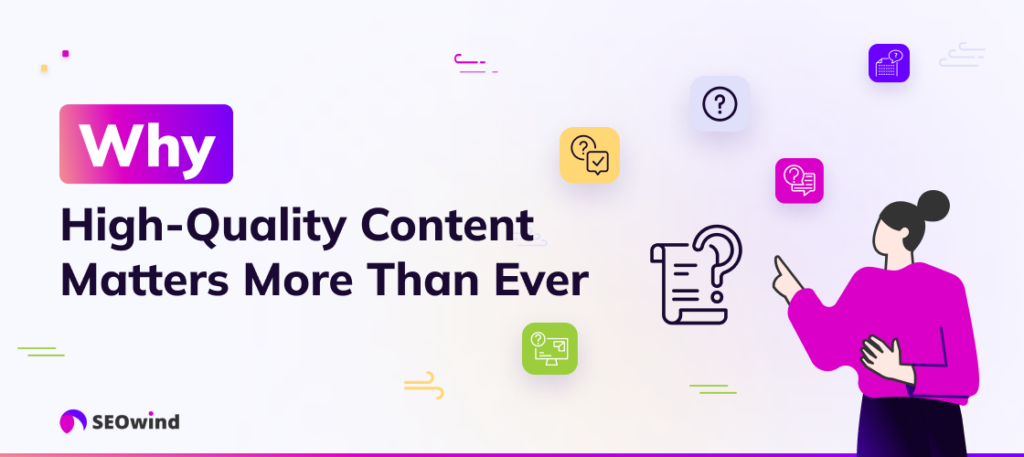
The Importance of Experience, Expertise, Authoritativeness, Trustworthiness (E-E-A-T)
In the current digital age, where information is ubiquitous, and misinformation lurks around every corner, ensuring that your content upholds the principles of Experience, Expertise, Authoritativeness, and Trustworthiness (commonly abbreviated as E-E-A-T) has never been more crucial. These elements enhance user satisfaction and significantly influence how well content performs in search engine rankings.
- Experience: Demonstrating practical knowledge or direct observation in your field assures users of the authenticity and reliability of your content.
- Expertise: Proficiency or skill derived from training and experience in a particular area, which informs deeper insights shared within your content.
- Authoritativeness: Being recognized as a leading source of information boosts user trust and confidence in the shared knowledge.
- Trustworthiness: Transparent communication and ethical information gathering lead to user trust, further influencing Google’s trust in your site.
These factors support robust SEO strategies because producing high-quality content based on these principles goes beyond fulfilling search intent to create an environment where visitors feel valued and informed. That kind of credibility can significantly elevate one’s visibility on Google.
The Role of Content in SEO: Perceptions vs. Reality
The longstanding view that “content is king” continues to have merit, albeit with a more nuanced understanding. While generating keyword-stuffed articles was once considered enough for higher rankings, today’s SEO landscape demands quality that resonates with human readers rather than just algorithms. Whether or not AI-generated content is good for SEO depends on how we harness the capabilities of these automated tools.
Despite the efficiency offered by AI when generating a great deal of text swiftly, the scenario is more complex than feeding raw data into an algorithm. Let us consider two compelling statistics:
- 72% of B2B marketers use generative AI tools for content-related tasks.
- 64% of content marketers said they regularly use AI in their processes.
These figures suggest extensive integration within marketing workflows while emphasizing the necessity for a calculated approach when employing automated systems.
Best Practices for High-Ranking AI-Generated Content
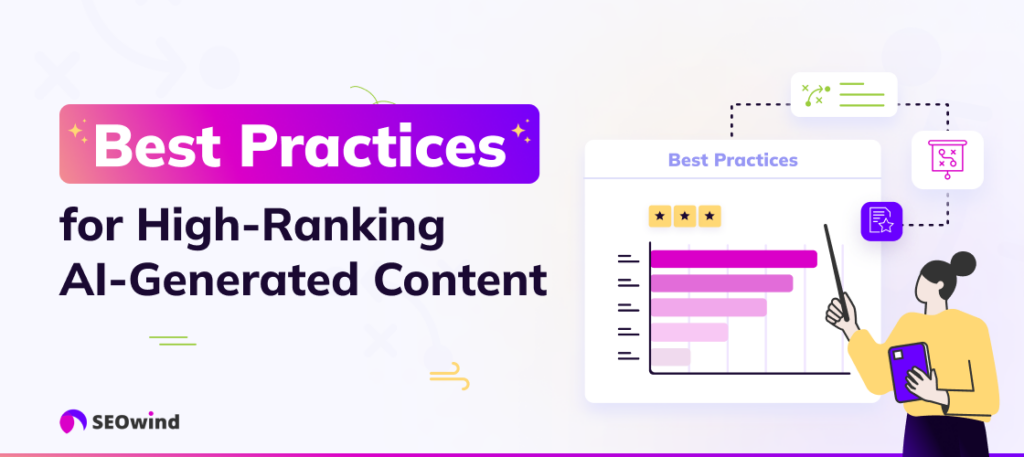
The digital landscape is evolving, and so are the techniques to stay atop search engine results. When crafting AI-generated content to rank highly on Google, several best practices can dramatically influence your success rate. Let’s go over some strategies that blend technology with human insight to achieve SEO success.
1. Find the Right AI Tools for SEO Enhancement
Identifying and utilizing optimal AI tools is indispensable to shaping high-ranking content. Tools for AI SEO content automation, such as SEOwind, harness powerful algorithms that suggest keywords and help optimize the article structure to align with Google’s ranking preferences. These tools provide a competitive edge by ensuring your content is written well and SEO-friendly.
Additionally, services like generative engine optimization can help you further refine and tailor your content strategy for local and geo-specific searches. Generative engine optimization service enables businesses to enhance their presence in local markets through specialized AI-driven optimization techniques.

2. Embrace CyborgMethod™
The CyborgMethod™ is a hybrid approach that leverages human creativity and machine efficiency, enabling us to produce enriched content at scale.
By using this approach, I managed to skyrocket organic traffic by 418%. I helped grow the already prosperous company’s organic traffic from 3.768 clicks, according to GSC, in March 2023 to 15.744 in March 2024. That’s 418% growth Year over Year!
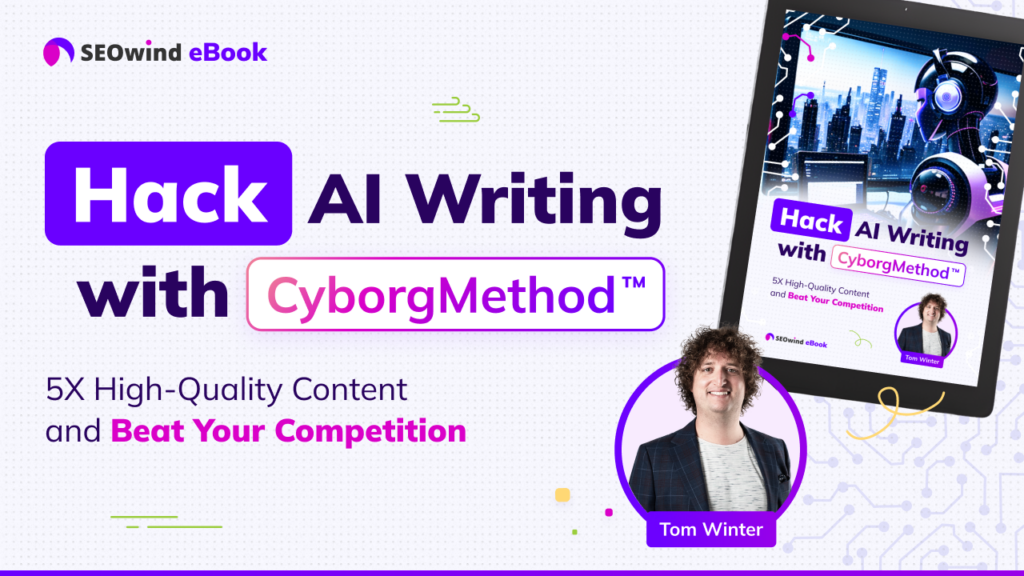
3. Do the Research
Investing time into research is non-negotiable. Understanding what resonates with your audience enables you to craft enlightening and engaging messages. Merging AI capabilities with thorough market studies enhances this process, allowing for deeper insights and more precise targeting, which pave the way for higher engagement rates.
4. Feed AI With Relevant Data
Feeding your AI tool with accurate and extensive data sets yields higher-quality output. Recent statistics will enhance the content’s relevance and credibility, making it more likely to attract readers’ and algorithms’ attention.
5. Create a Content Outline To Make AI Writing Easier
Organizing your thoughts in a detailed outline simplifies the writing process significantly for AI tools. Setting clear guidelines about intended headers, key points, and logical progression within an article ensures consistency, which is essential for retaining reader interest.
6. Ensure Your Brand’s Voice Remains Consistent
Maintaining a consistent voice across all communications strengthens your brand identity, making it easily recognizable for loyal followers. All of your content should maintain a coherent narrative style, regardless of whether it was generated by a human or machine.
7. Leverage Human Editorial Oversight For Quality Assurance
Finally, integrating human oversight is of the utmost importance. Even the most advanced AI requires guidance to ensure nuances are correct, the tonality fits your brand ethos, and factual accuracy is consistent throughout your published work. These factors are absolutely necessary if you’re aiming for the top slots on SERPs.
By adopting this structured approach, where technology is supported by tactful handling, deploying AI-generated SEO content becomes feasible and advantageous by effectively tapping into Google’s dynamic algorithm preferences.
Google’s Stance on AI Content Spam: What to Avoid
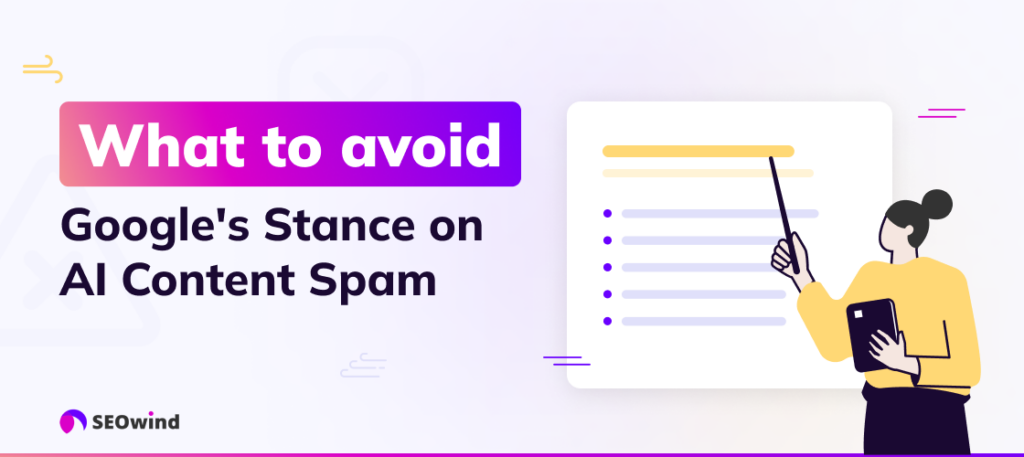
It’s crucial to understand Google’s stringent rules against what they deem to be spammy content. The tech giant continuously updates its algorithms to ensure a high-quality user experience, prioritizing content that provides real value over manipulative or low-effort material created solely for SEO purposes.
Identifying the patterns of spammy content
Google has become increasingly adept at identifying and penalizing spammy content, which often includes pages that are filled with disjointed or nonsensical information and overly optimized for specific keywords. Such tactics can lead to a poor user experience and severe ranking penalties from Google. Here are some common indicators of spammy, AI-generated content:
- Keyword stuffing: Repeating the same words or phrases so often that it sounds unnatural.
- Irrelevant content: Generating text that is off-topic or irrelevant to the actual search intent.
- Manipulative text: Inserting numerous unrelated links that lead back to a website, hoping to boost SEO.
- Duplicated content: Producing large volumes of text that are copied and barely altered from the existing sources.
By avoiding these practices, you safeguard your site from penalties and maintain your rankings within Google search results.
Google’s long-term strategy against AI-generated spam
Understanding that 62% of content marketers have concerns about AI diminishing the perceived value of skilled writers and editors, Google continually evolves its algorithm to promote superior quality and human involvement in content creation. Its long-term strategy involves enhancing machine learning models that detect nuanced types of spam more efficiently. Additionally, the company rewards those who contribute positively with authentic information that guides users most effectively.
Moreover, ensuring adherence to its updated guidelines emphasizes E-E-A-T. This forms the core assessment criteria used by the latest algorithms to evaluate web page quality and determine how well a piece of content should rank in search results. By promoting standards such as E-E-A-T through rigorous evaluation processes like peer-review sessions involving Search Quality Raters worldwide, Google solidifies its commitment to enriching the internet with valuable information rather than allowing it to become diluted by mediocre automated write-ups.
Does AI Content Rank in Google – Case Study
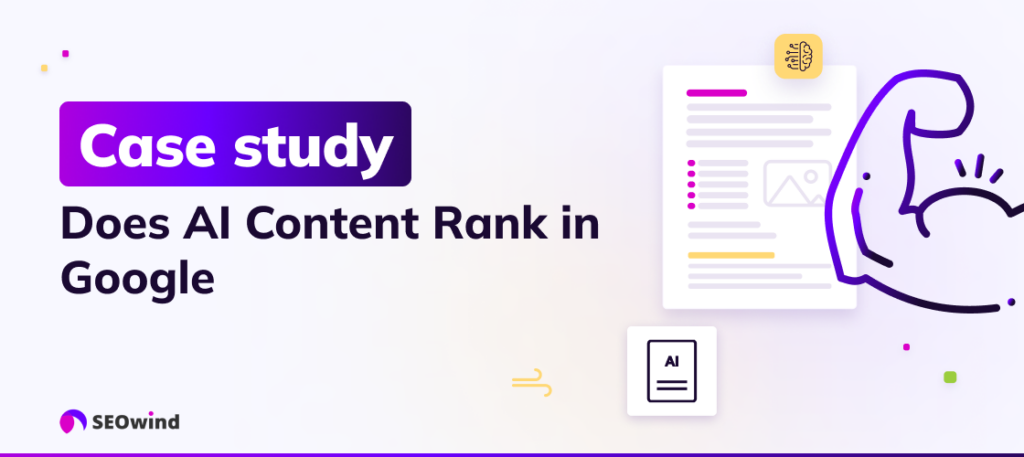
In a dynamic experiment to explore the potential of AI in content creation, we embarked on an ambitious project: the AI Writing Challenge. The goal was simple yet audacious: generate and publish 100 AI-driven blog posts over 30 days on the SEOwind.io domain. This platform effectively mirrors typical customer websites.
The Setup and Execution
The strategy was to leverage sophisticated AI tools to generate diverse content spanning several topics relevant to our audience. Each piece was meticulously crafted to ensure it adhered to SEO best practices while still incorporating the necessary keywords naturally within the text. This integration aimed to enhance search engine visibility without interrupting the text’s natural flow.
Observing Google’s Response
Throughout the challenge, we closely monitored how well these AI-generated articles performed in terms of indexing and ranking on Google. It provided real-time feedback on various factors:
- Relevance: How effectively did AI stay on topic and answer specific user queries?
- Engagement Metrics: What were the bounce rates? Did readers stick around long enough to engage with other linked content?
- SEO Performance: How well did these posts compete with human-written content in organic searches.
Insights Gained
As posts began ranking, patterns emerged that helped tailor future strategies:
- High-quality, contextually appropriate content generated by AI could rank competitively.
- Consistent voice and adherence to SEO conventions were pivotal.
- Immediate oversight by human editors before publishing ensured that grammatical errors or awkward phrasings were eliminated.
By experimenting with an actual deployment scenario like this one, we demonstrated what AI can achieve today and refined methods for efficiently integrating automated writing into standard web content strategies.
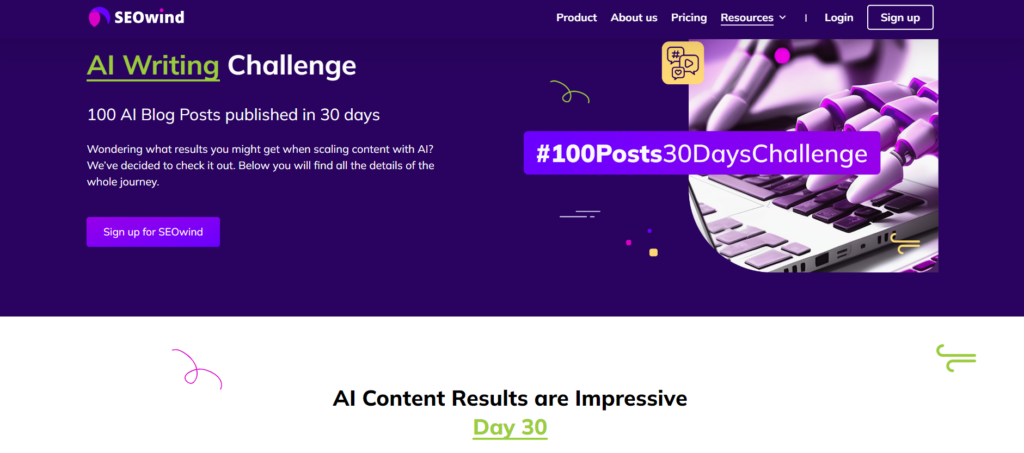
Questions on AI content ranking on Google
Many wonder if their efforts to deploy AI for writing will bear fruit in terms of search engine visibility. Here, we’ll explore some common inquiries regarding the ranking capabilities of AI-created articles on Google.
Can an article written by AI rank on Google?
The short answer is yes, an article crafted by AI can indeed rank on Google. But it’s not just about whether AI wrote it; the quality and value it offers are what truly matter. Google’s sophisticated algorithms are designed to reward content that provides real value to users regardless of whether a human or machine wrote it. However, given that these algorithms also prioritize uniqueness and insightful analysis, merely generating generic AI-written content might not suffice. It must be fine-tuned and enriched with genuine expertise to stand out.
Do AI-generated articles rank on Google?
Absolutely! AI-generated articles have the potential to rank well on Google as long as they meet certain standards of quality and relevance defined by search engine guidelines. Adhering to SEO best practices such as proper keyword usage, valuable information richness, engagement capability, and structural coherence is pivotal to this achievement. While AI can provide a solid base or draft for your content, elevating its quality through strategic enhancement dictates how well it performs on SERPs.
Can ChatGPT content rank on Google?
ChatGPT has made waves with its conversational abilities. The efficacy of ChatGPT’s content for SEO hinges on how it’s utilized. When supplemented with human oversight to ensure accuracy and ethical practices, ChatGPT-authored content has significant potential to achieve favorable rankings.
Is your AI content getting indexed?
Whether or not your AI-driven output gets indexed typically depends on factors that apply equally to traditionally authored content. Is your text unique? Does it provide value that isn’t found elsewhere? Search engines want to deliver new perspectives to user queries. As such, duplicated or low-value submissions generally fail at indexing regardless of how they were developed. Understanding these dynamics empowers you to craft strategies that significantly improve your chances for indexing and improving your organic search outcomes.
